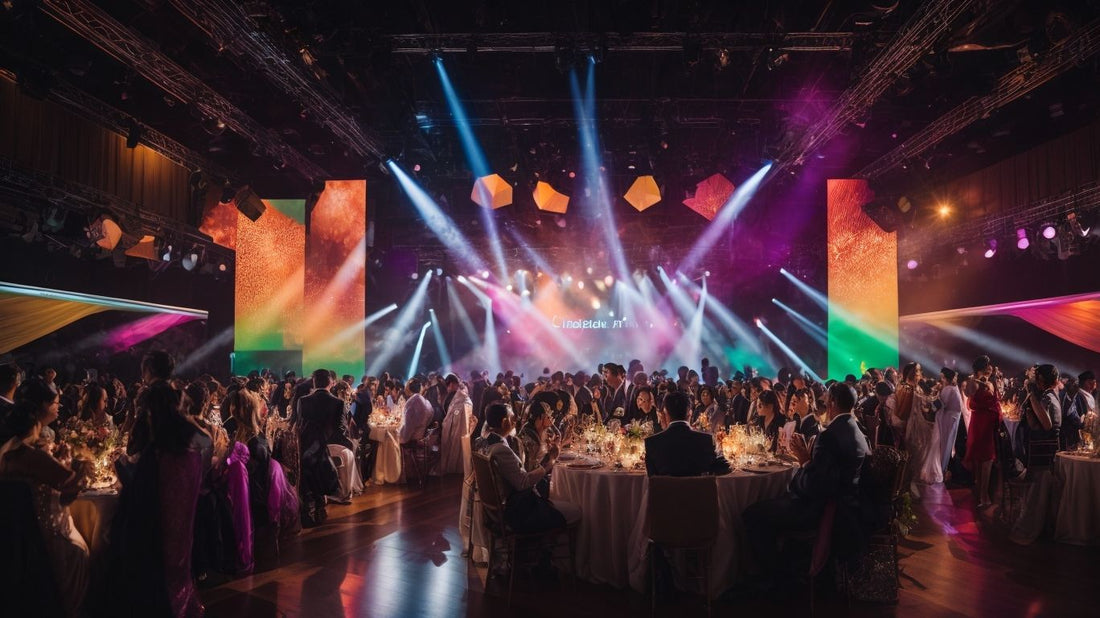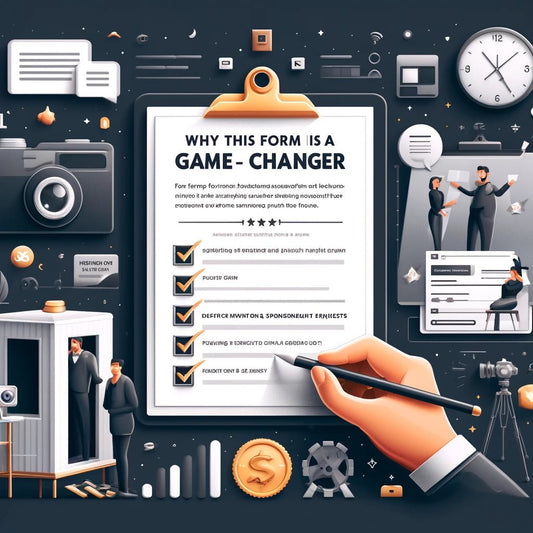
Discover the Latest Corporate Event Trends Guiding Success
Share
.jpg)
Corporate events play a crucial role in the business world, serving as platforms for networking, knowledge sharing, and brand building. To stay ahead in the competitive landscape, it is essential to keep up with the latest corporate event trends. By doing so, businesses can deliver engaging and memorable experiences to attendees, ultimately enhancing their overall event outcomes. iVenture mentions the following trends shaping corporate events currently:
1. Virtual and Hybrid Events: With the rise of technology and the need for flexibility, virtual and hybrid events have gained popularity. These formats allow attendees to participate remotely or attend in-person, blending the best of both worlds.
2. Enhanced Attendee Engagement: The focus now lies in creating interactive and immersive experiences for attendees. Incorporating activities, gamification, live polling, and networking opportunities ensure active participation and engagement.
3. Focus on Sustainable Practices: Corporate events are becoming more eco-friendly by implementing sustainable practices. This includes reducing carbon footprints, promoting recycling, using environmentally friendly materials, and supporting local communities.
4. Incorporating Technology: Technology integration is essential to enhance event experiences. The use of event apps, live streaming, augmented reality (AR), and virtual reality (VR) creates dynamic and interactive environments.
5. Unique Venue Selection: Event organizers are moving away from traditional venues to create unique and memorable experiences. These include outdoor locations, historical landmarks, or unconventional spaces that align with event themes and objectives.
6. Personalization and Customization: Customizing event experiences based on attendee preferences and interests helps create a more personalized and memorable experience. Tailored content, networking opportunities, and personalized swag add value to participants.
Looking towards the future, corporate event trends show exciting advancements:
1. Incorporation of Artificial Intelligence (AI): AI-powered tools can enhance event planning, participant engagement, and data analytics, providing personalized recommendations and real-time insights.
2. Increased Emphasis on Wellness and Well-being: Recognizing the importance of attendee well-being, future events will integrate wellness activities, mindfulness sessions, and healthy catering options.
3. Integration of Virtual Reality (VR) and Augmented Reality (AR): These immersive technologies will create more interactive and engaging event experiences, allowing attendees to explore virtual environments and interact with digital content.
By following corporate event trends, businesses can reap several benefits. These include staying ahead of the competition, delivering exceptional attendee experiences, maximizing ROI, increasing brand value, and adapting to changing industry dynamics. Embracing these trends ensures that corporate events remain impactful and relevant in today's fast-paced business landscape.
Importance of Keeping Up with Corporate Event Trends
Keeping up with corporate event trends is of utmost importance in order to maintain relevance and competitiveness in the business world. It is vital for companies to showcase their brand as innovative and forward-thinking, attracting both clients and top talent. In addition, being aware of the latest event trends ensures that companies are able to deliver memorable experiences that capture the attention of attendees and leave a strong impression. By incorporating new technologies, creative themes, and interactive elements, businesses have the ability to create engaging and impactful events. Neglecting to stay up to date with these trends may result in events that appear outdated and fail to meet the expectations and desires of the attendees. Through history, it has been proven that companies that adapt to changing trends are more likely to achieve long-term success.
Current Corporate Event Trends
Let's dive into the exciting world of current corporate event trends! From virtual and hybrid events to enhanced attendee engagement, sustainable practices, and the incorporation of technology, we'll explore the hottest topics shaping the corporate event industry. Get ready to discover how unique venue selection, personalization, and customization are taking corporate events to the next level. So grab your pen and notepad, because we're about to unfold a wealth of insights and ideas for making your next corporate event a memorable success!Virtual and Hybrid Events
Virtual and hybrid events have become increasingly popular in recent years, especially in 2020 due to the COVID-19 pandemic. Here are some key points to consider when planning virtual and hybrid events:
Enhanced Attendee Engagement
Enhanced attendee engagement is a key trend in the corporate event industry. To create memorable and interactive experiences for participants, event planners are leveraging various strategies to foster active participation.
- Interactive sessions: Embracing live polls, Q&A sessions, and interactive workshops stimulates and encourages attendees to actively engage.
- Networking opportunities: By facilitating networking through dedicated sessions, speed networking, or gamification activities, event organizers help attendees connect and forge valuable relationships.
- Immersion experiences: Leveraging technologies like virtual reality or augmented reality, attendees can immerse themselves in captivating experiences that intensify their engagement and leave a lasting impact.
- Gamification: Infusing games, challenges, or competitions injects a sense of excitement and engagement, enriching the overall event experience.
- Social media integration: Actively encouraging attendees to share their event experiences on social media platforms using event-specific hashtags heightens engagement and amplifies event awareness in an organic manner.
Focus on Sustainable Practices
When planning corporate events, it's crucial to focus on sustainable practices in order to prioritize sustainability and minimize environmental impact. This approach aligns with the values of attendees and stakeholders.
- Implement waste reduction and recycling measures to minimize the event's carbon footprint and demonstrate a commitment to sustainability.
- Select venues that hold eco-friendly certifications or have established green initiatives.
- Choose sustainable catering options, such as locally-sourced and organic food. Additionally, opt for biodegradable or reusable utensils and dinnerware to further promote sustainability.
- Incorporate digital solutions, like digital event programs and mobile ticketing, to reduce paper waste significantly.
- Encourage alternative transportation options, such as public transportation, carpooling, or providing bike racks, to further support sustainable practices among attendees.
By prioritizing sustainable practices, corporate events can actively contribute to the protection of the environment and inspire others to adopt greener approaches.
During the early 2000s, corporate event planners faced immense pressure from environmental groups to adopt sustainable practices, and rightfully so. This pressure led to the widespread implementation of eco-friendly initiatives, including recycling programs, energy-efficient lighting, and carbon offsetting. The focus on sustainable practices not only reduced the ecological impact of corporate events but also demonstrated a strong commitment to social responsibility, shaping the future of event planning.
Incorporating Technology
Integrating technology is crucial for successful corporate events in today's digital age. Here are some ways to leverage technology:
- 1. Event Management Software: Utilize platforms like Eventbrite or Cvent for seamless registration, ticketing, and guest management.
- 2. Mobile Apps: Develop a dedicated event app to enhance attendee engagement and provide real-time updates.
- 3. Live Streaming and Virtual Attendees: Offer virtual attendance options, allowing remote participants to join and interact.
- 4. Interactive Experiences: Utilize technologies like augmented reality or virtual reality to create immersive and interactive experiences.
- 5. Social Media Integration: Leverage social media platforms to promote the event, engage attendees, and extend the reach.
By incorporating technology, you can elevate your corporate events, attract tech-savvy attendees, and stay ahead of the competition.
Unique Venue Selection
Choosing a unique venue selection for corporate events can enhance the overall experience and leave a lasting impression on attendees. Consider the following factors when selecting a venue:
- Location: Choose a venue that is easily accessible and convenient for attendees.
- Ambiance: Look for a venue that matches the theme and tone of your event, whether it's a modern art gallery or a historic mansion.
- Facilities: Consider the amenities and services offered by the unique venue selection, such as audiovisual equipment, catering options, and parking facilities.
- Capacity: Ensure that the unique venue selection can accommodate the number of attendees comfortably.
- Flexibility: Opt for a unique venue selection that can be customized to meet your specific event requirements.
- Cost: Evaluate the cost of the unique venue selection in relation to your budget, keeping in mind any additional expenses for decorations or equipment.
Pro-tip: Don't forget to visit the unique venue selection in person to get a feel for the space and assess its suitability for your event.
Personalization and Customization
Personalization and customization are key trends in the corporate event industry. By incorporating personalization and customization strategies, event planners can create a more engaging and memorable event for their attendees. Here are some valuable methods to embrace personalization and customization:
- Create a personalized registration experience by offering custom forms and tailored content. This will enhance the attendees' overall event experience.
- Allow attendees to personalize their agendas by choosing sessions that align with their interests and goals. This will make the event more valuable and relevant to each individual attendee.
- Offer customized branding opportunities, such as personalized swag or branded materials, to enhance the overall brand experience for attendees.
- Enhance networking opportunities by providing personalized matchmaking tools or introductions. This will help attendees connect with others who share similar interests or goals.
- After the event, provide personalized follow-up experiences, such as targeted post-event surveys or personalized thank-you emails, to further engage attendees and gather valuable feedback.
By embracing the concepts of personalization and customization, corporate events can deliver unique and meaningful experiences that leave a lasting impact on attendees.
Fun Fact: The practice of personalization and customization dates back centuries, with ancient rulers like King Louis XIV of France known for hosting elaborate events tailored to individual guests' preferences and interests.
Future Outlook of Corporate Event Trends
Get ready to delve into the exciting future of corporate event trends! We'll explore the incorporation of Artificial Intelligence, the increased emphasis on wellness and well-being, and the integration of Virtual Reality and Augmented Reality. Buckle up for a captivating journey of technological advancements, enhancing attendee experiences, and pushing the boundaries of traditional corporate events. It's time to envision a whole new world of possibilities for the future of corporate gatherings.Incorporation of Artificial Intelligence
Incorporation of Artificial Intelligence
Incorporating artificial intelligence (AI) into corporate events can greatly enhance attendee experiences and streamline event planning processes. The incorporation of AI can be witnessed in the following ways:
Intelligent chatbots: The incorporation of AI-powered chatbots enables the provision of instant customer support, addressing frequently asked questions, and delivering personalized interactions.
Data analysis: AI algorithms facilitate the analysis of vast amounts of data, enabling the identification of patterns and trends. This, in turn, assists event planners in making well-informed decisions.
Virtual assistants: AI assistants can now seamlessly assist attendees with various tasks such as scheduling meetings, providing directions, and suggesting personalized content.
Smart event management systems: The incorporation of AI into event management systems automates tasks such as event registration, ticketing, and attendee engagement, thereby simplifying event logistics.
Predictive analytics: Utilizing AI, predictive analytics can evaluate past attendee behavior and predict their preferences. Consequently, event marketers can adopt more targeted marketing strategies and offer personalized experiences.
Increased Emphasis on Wellness and Well-being
Corporations are placing an increased emphasis on wellness and well-being in their events. This trend recognizes the importance of prioritizing the physical and mental health of attendees. By incorporating activities like yoga or mindfulness sessions, providing healthy food options, and offering relaxation spaces, corporations are actively promoting well-being at their events. This shift in focus reflects the growing awareness of the impact that corporate events can have on the overall wellness of participants. As companies strive to create a positive and holistic experience, they are recognizing the value of taking care of attendees' well-being alongside achieving business objectives.
Integration of Virtual Reality and Augmented Reality
The integration of virtual reality and augmented reality into corporate events is becoming increasingly popular as it provides immersive and interactive experiences for attendees.
- Enhanced Engagement: Virtual reality and augmented reality allow participants to engage with content in a more interactive and immersive way, creating memorable experiences.
- Product Demonstrations: Companies can showcase their products or services through virtual reality, allowing attendees to explore and interact with them in a virtual environment.
- Virtual Tours: Virtual reality can provide virtual tours of venues or destinations, giving attendees a preview of what to expect and helping them make informed decisions.
- Training and Education: Augmented reality can be utilized for training sessions, providing hands-on learning experiences and simulations.
- Brand Differentiation: Integrating virtual reality and augmented reality into corporate events can help companies stand out and leave a lasting impression on attendees.
To successfully integrate virtual reality and augmented reality into corporate events, it is important to ensure that the technology is easily accessible, provide clear instructions for participants, and offer support throughout the experience. Incorporating these technologies can elevate the overall event experience and create a more engaging and memorable event for attendees.
Benefits of Following Corporate Event Trends
In today's fast-paced corporate world, keeping up with the latest event trends can have numerous benefits. From creating valuable in-person experiences to boosting cost savings and efficiency, staying in tune with the pulse of corporate event trends is crucial. In this section, we'll explore the advantages of following these trends, including the potential for lead generation opportunities and the power of building strong customer relationships. Get ready to discover how staying ahead of the curve can help your business thrive.Valuable In-Person Experiences
Valuable In-Person Experiences are highly sought after in the world of corporate events. Here are some key reasons why:
- Networking opportunities: Meeting face-to-face allows for authentic connections and the chance to form valuable professional relationships.
- Interactive learning: In-person events facilitate hands-on learning experiences through workshops, demonstrations, and interactive sessions.
- Engaging entertainment: Live performances, keynote speakers, and interactive activities create memorable and engaging experiences for attendees.
- Collaborative problem solving: Being physically present enables effective brainstorming, collaboration, and problem-solving among attendees.
- Exposure to new ideas: In-person events provide a platform for discovering innovative ideas and trends, fostering creativity and inspiration.
Fact: According to a survey, 86% of professionals believe in-person events are essential for their career growth and success.
Cost Savings and Efficiency
When planning corporate events, it is crucial to consider cost savings and efficiency. By implementing certain strategies, event organizers can maximize their budget and streamline operations:
Lead Generation Opportunities
Lead generation opportunities are crucial in corporate event planning as they can help businesses maximize their event ROI and expand their customer base. If you are planning corporate events, here are some effective strategies to consider:
- Engaging content: To capture attendees' interest and gather their contact information, offer valuable and informative content during the event. This can include workshops, panel discussions, or educational sessions.
- Interactive activities: Incorporate interactive experiences like gamification, contests, or live polls to engage attendees and collect their contact information.
- Networking opportunities: Create opportunities for attendees to connect and exchange contact details through networking sessions, matchmaking programs, or dedicated lounges.
- Lead capture tools: Utilize technology solutions such as QR codes, lead retrieval apps, or digital business card exchanges to streamline the collection of leads.
- Follow-up campaigns: Develop a well-planned follow-up strategy, which may include personalized emails, phone calls, or social media engagements, to nurture and convert leads after the event.
By leveraging these lead generation opportunities, corporate events can serve as valuable platforms for businesses to connect with potential customers, generate leads, and drive business growth.
Building Customer Relationships
Building strong customer relationships is absolutely crucial for businesses to thrive. When it comes to corporate events, they provide a unique and valuable opportunity to connect with customers on a deeper level. Here are some effective strategies to foster and strengthen customer relationships through corporate events:
By incorporating these strategies, businesses can effectively cultivate and nurture long-term customer relationships, ultimately leading to increased loyalty and success in the marketplace.
The Impact of Corporate Event Trends on the Event Industry
As the event industry continues to evolve, it's crucial to understand the impact of corporate event trends. From rising event costs and ongoing staffing shortages to the ever-expanding role of technology and social media, these trends shape the landscape in which events thrive. Join us as we explore how these factors influence the event industry, unveiling the challenges and opportunities they present for organizers, attendees, and stakeholders alike. Get ready to dive into the dynamic world of corporate event trends and discover the key factors driving change in this exciting industry.Rising Event Costs and Inflation
Rising event costs and inflation can have a significant impact on corporate event planning and budgets. To tackle this challenge, consider the following strategies:
Plan ahead: Initiate event organization early to secure favorable rates and negotiate contracts.
Budget flexibility: Allocate a portion of your budget for unexpected cost increases and prioritize expenses.
Alternative venues: Explore non-traditional venues or locations outside major cities to discover more affordable options.
Sponsorships and partnerships: Seek collaborations with sponsors or vendors who can help offset costs in exchange for exposure or collaboration.
Technology integration: Incorporate virtual components or innovative technology solutions to decrease expenses on travel and logistics.
In a real-life scenario, a corporate event planner faced rising event costs and inflation but achieved success by securing a partnership with a local venue and implementing a hybrid event model. This enabled them to reduce costs without compromising the attendee experience.
Ongoing Staffing Shortages
The corporate event planning industry is currently facing ongoing staffing shortages, which pose a significant challenge. The limited availability of experienced and qualified staff has the potential to hinder the execution and success of events. However, event planners are finding ways to overcome this issue by adopting innovative strategies. These strategies include leveraging technology to automate tasks, outsourcing certain roles to specialized agencies, and collaborating with event staffing platforms. To mitigate the impact of ongoing staffing shortages, event planners are focusing on building strong relationships with reliable vendors and creating a pool of trusted freelance professionals. By implementing these tactics, event planners can ensure seamless operations and deliver exceptional experiences, despite the challenges posed by staffing shortages.
The Role of Technology and Social Media
The role of technology and social media is becoming increasingly important in corporate event planning. Incorporating technology allows for innovative event experiences, such as virtual and hybrid events, augmented reality, and artificial intelligence. Moreover, social media platforms provide a powerful tool for event promotion, engagement, and feedback. To streamline processes and enhance attendee experiences, event management software and mobile apps can be utilized. Integrating technology and social media not only improves event planning and execution but also extends the reach and impact of corporate events. To stay relevant and maximize event success, it is essential to keep up with these trends.
Strategies for Successful Corporate Event Planning in 2023
Implement strategies for successful corporate event planning in 2023 to define event objectives and goals and ensure clarity and focus throughout the planning process.
Create a detailed budget to allocate resources appropriately and avoid overspending during the successful corporate event planning in 2023.
Identify and secure a suitable venue that aligns with the event's theme and accommodates the desired number of attendees, following strategies for successful corporate event planning in 2023.
Develop a comprehensive timeline to keep track of tasks and deadlines, ensuring everything stays on schedule in the successful corporate event planning in 2023.
Engage with experienced vendors and suppliers to ensure the highest quality services and products within the allocated budget by implementing strategies for successful corporate event planning in 2023.
Implement effective communication and marketing strategies to promote the event and maximize attendance in the successful corporate event planning in 2023.
Integrate technology solutions, such as event management software and mobile apps, to streamline registration, ticketing, and attendee engagement in the successful corporate event planning in 2023.
Prioritize attendee experience by offering personalized touches, interactive elements, and networking opportunities in the successful corporate event planning in 2023.
Execute post-event evaluations to gather feedback and identify areas of improvement for future events, following strategies for successful corporate event planning in 2023.
Frequently Asked Questions
What impact has rising inflation and staffing shortages had on the corporate event industry?
Rising inflation and staffing shortages have posed challenges for the corporate event industry. These factors have led to increased event costs, making it necessary for organizations to focus on cost savings and efficiencies in 2023. They will need to prove event ROI and demonstrate the impact and business value of events.
How has the digitization of events enhanced attendee engagement?
The event industry has embraced the digitization of events for enhanced attendee engagement. In 2023, organizations are incorporating more digital elements into in-person events, allowing for valuable insights on attendee behavior and personalized experiences. Digital touchpoints also extend event engagement beyond traditional start and end dates.
What is the importance of a multi-format event strategy?
Organizations are focusing on delivering a multi-format event strategy in 2023. This strategy uses a mix of in-person, virtual, and hybrid formats to continually engage audiences. In-person events will serve as the core, while virtual events will act as the connective tissue between them.
How can event technology providers support the evolving needs of the industry?
The role of event technology providers is evolving to meet the needs of the industry. They are now focused on providing comprehensive solutions and support. This includes the use of standardized processes, new technology, and integration of artificial intelligence and machine learning to enhance event experiences.
What trends are shaping the future of corporate events?
Several trends are shaping the future of corporate events in 2023. These include the return of in-person events with a digital twist, the rise of virtual reality and augmented reality, the importance of sustainability and eco-friendly practices, and the integration of data analytics and insights to measure event success and make data-driven decisions.
How has the COVID-19 pandemic impacted the event industry?
The COVID-19 pandemic has had a significant impact on the event industry. It has accelerated the adoption of digital technologies and changed attendee expectations. It has also highlighted the importance of event security and privacy as events collect more data.






